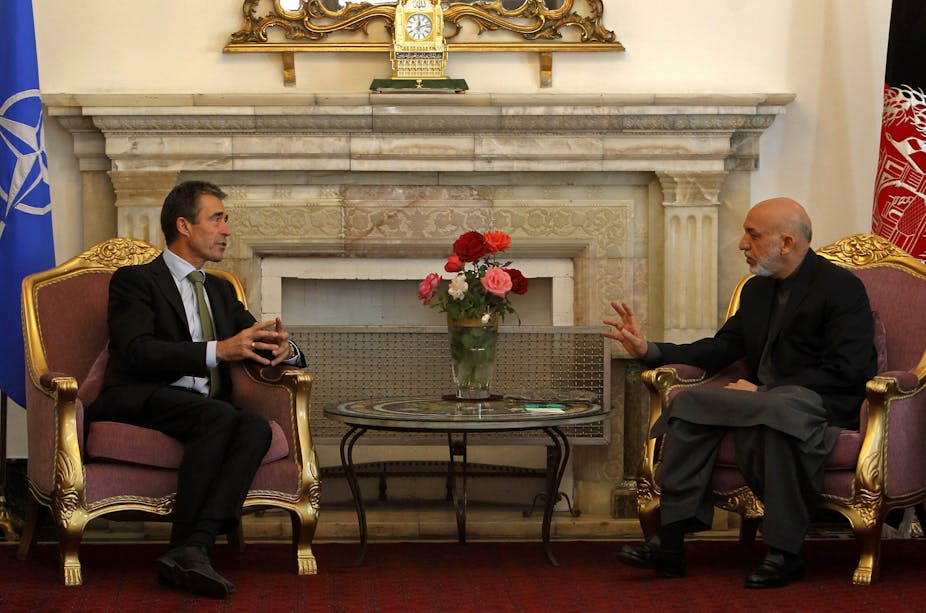The end of the US troops surge, the increasing insider attacks on Western forces and the ongoing downward spiral of insecurity across Afghanistan, have pushed this war-torn country into a military-political deadlock. The Western exit strategy — to end combat by the end of 2014 and leave the Kabul regime to take hold of Afghan national security and fight the Taliban alone – is a dysfunctional façade.
Considering two simple factors brings us to a conundrum that lies at the heart of the Afghan strategy. First, a lack of conceptual understanding of the country and its history. Second, the denial of the immense problems brought about by a long-reviled foreign military presence in the country. Recent Afghan history, especially the Soviet experience, teaches us that an army created by foreign forces and led by a client regime that has never been able to defend itself is a formula for self-imposed disaster.
Meanwhile, the Western plan of training Afghan forces and increasing their number is at best a short-term solution. Or, to put it more precisely, a waste of time and money. If there is one thing that the Afghans are good at it is certainly fighting. They don’t need to be taught how to fight, they need to be taught the will to fight instead.
During the last years of Soviet occupation of Afghanistan, the military situation had reached the same point. Russian troops and local Afghan combatants were fighting under circumstances in which they did not trust their own shadows. The local police and armed forces attacks on the Soviet forces had been systematic and the regime in Kabul was facing a nightmare of mass desertion in all its military garrisons.
During my six-month stay in Afghanistan in 2009, I spoke to many officers from the Afghan national army and police. The vast majority of these people spoke to me on the condition of anonymity. They made it clear that when they are sent to the battlefield, the first thing they think about is how to get away.
Post-2014, Afghanistan and the West will be largely dependent on the weaker warlords of the old Northern Alliance. The US unequivocally supports the warlords of the North, who consistently isolate the Pashtun majority. This has led the Pashtuns to believe that the Western campaign in Afghanistan means the dispossession of the Pashtun people to the hilt. This in turn fuels the rage of the Taliban and supports their strength and numbers.

Amid such gloomy prognoses, there is still one chance left for a lasting peace in Afghanistan – if the West has the will for a decisive paradigm shift in its Afghan strategy. A genuine reconciliation with the Pashtuns is possible with a face-to-face talk with the largely Pashtun Taliban.
The age-old tribal code of the Afghans, known to the Western anthropologists as Nanawaty and Pashtunwali has changed blood enemies into friends for centuries. There is an old saying, “with friendship, a Pashtun would gladly go with you to hell, but you can’t take him to paradise by force”. A genuine reconciliation between the Pashtuns and the West is possible if both sides are genuinely keen and honest.
The Taliban, on its part, has to decisively break up with al-Qaeda and respect international law and human rights. With genuine help from the US, the Taliban can deal with their mutual problem with Pakistan. In addition to Qatar’s negotiations, it is of paramount importance that the US and Kabul name one province “the Province of Peace”, where both warring sides declare a ceasefire and begin confidence-building measures. A fraction of what the US is currently spending on building the Afghan National Army and Police would be enough to facilitate this historic peace arrangement in Afghanistan.
Afghans have no natural enmity with Western civilisation. They are traditionally pro-Western despite this 11 year conflict. They see Russia as a traditional enemy and it is impossible for the Taliban to form an alliance with communist China.
Afghanistan’s neighbours Pakistan, Iran and Russia will do everything to jeopardise such a historical peace process between the two warring sides. Avoiding this opportunity, Afghanistan will slide into a civil war and the US-backed regime in Kabul will collapse.
The sad truth is that Western failure in Afghanistan will not be limited to Afghanistan. The ripple effects are going to be felt throughout the region for many decades to come.

